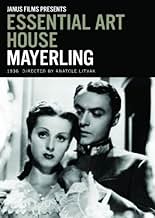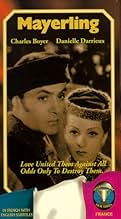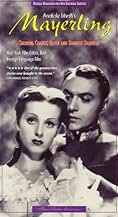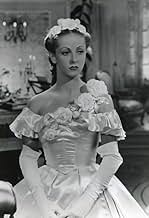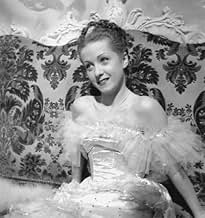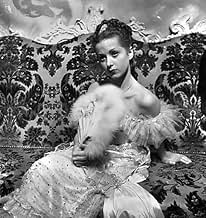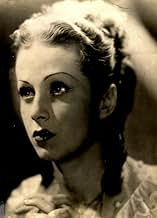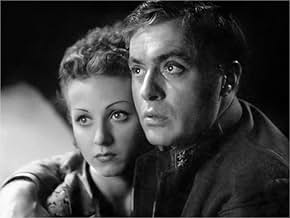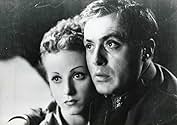L'histoire en 1889 dans l'empire hongrois, de l'archiduc Rodolphe de Habsbourg, qui marié, s'éprend pourtant d'une jeune fille.L'histoire en 1889 dans l'empire hongrois, de l'archiduc Rodolphe de Habsbourg, qui marié, s'éprend pourtant d'une jeune fille.L'histoire en 1889 dans l'empire hongrois, de l'archiduc Rodolphe de Habsbourg, qui marié, s'éprend pourtant d'une jeune fille.
- Réalisation
- Scénario
- Casting principal
- Récompenses
- 3 victoires et 1 nomination au total
Marthe Régnier
- La baronne Vetsera
- (as Marthe Regnier)
Assia Granatouroff
- La cousine de Marie
- (as Assia)
Christiane Ribes
- Une fille
- (as Ribès)
René Bergeron
- Szeps
- (as Bergeron)
Vladimir Sokoloff
- Le chef de la police
- (as Sokoloff)
Raymond Aimos
- Le premier policier
- (as Aimos)
André Siméon
- Le second policier
- (as Siméon)
Avis à la une
This is the original movie version of the murder/suicide pact between Archduke Rudolph, heir to the throne of the Austro-Hungarian empire, and his mistress, Baroness Marie Vetsera. Made in France and subtitled for the English speaking audience, it stars Charles Boyer as Rudolph and Danielle Darrieux as Marie. Boyer obviously appeared to better advantage in French films... .....his whole persona appears different than that in his American roles. His interpretation of Rudolph is one of a tortured man who does not have much to do while waiting around to inherit the throne, so he dallies with Marie Vetsera and falls in love with her. Danielle Darrieux is bewitching as the Baroness.
The story unfolds to the inevitable conclusion of murder/suicide which threw the Empire into turmoil. History may record the events of what happened at Mayerling a little differently but it surely makes a good story of thwarted love and royal politics. The 1968 remake with Omar Shariff and Catherine Deneuve is not bad either. This legendary romance has fascinated people since the turn of the century. So have the Kleenex handy and enjoy!!
The story unfolds to the inevitable conclusion of murder/suicide which threw the Empire into turmoil. History may record the events of what happened at Mayerling a little differently but it surely makes a good story of thwarted love and royal politics. The 1968 remake with Omar Shariff and Catherine Deneuve is not bad either. This legendary romance has fascinated people since the turn of the century. So have the Kleenex handy and enjoy!!
Historical drama, melodrama. The film adaptation of the novel of the same name by French writer Claude Anet, in turn based on real events. And since I have not read the original book source, therefore I will evaluate the film adaptation as an independent work, with an eye on real historical events, of course. This picture attracted me with the name of director Anatoly Litvak (Anatoly Mikhailovich Litvak) - a Soviet, European, and Hollywood director who shot a number of memorable pictures, personally I watched with pleasure his works such as "The Battle for Russia" (he was also a screenwriter, and the second director was Frank Capra) and "Night of the Generals" (a detective thriller about the Second World War). Both paintings are strongly recommended for viewing. But with "Mayerling" Anatole's career in Europe gave a sharp start, after the success of this picture he was invited to Hollywood. And here's my brief opinion for you - A romantic version of an old tragedy. There were both advantages and disadvantages in the picture, which should never be forgotten. And this concludes such an important introduction and gets to the point.
So, the advantages: 1. Scenario - if we do not take into account historical inaccuracies and various omissions (which will be discussed later), then we are faced with a tragic love story of the Archduke (heir to the throne) The Austro-Hungarian Empire of Rudolf and his young lover (actually mistress) Baroness Maria Vechera, who committed suicide on January 30, 1889 in the hunting castle of Mayerling (which is near Vienna). Rudolf is married, but unhappy in his marriage, and only acquaintance with seventeen-year-old Maria gave him hope for a better life. After all, the prince is also a liberal, and directly undermines the authority of his father in the state by supporting revolutionary-minded subjects. Moreover, this picture does not consider the political version of suicide, because everything is put in such a way that it is the romantic version that is correct. Indeed, it is the most common and the most studied. And the script itself is built in such a way that the viewer becomes completely on the side of Rudolf and Maria, who were simply driven into a trap - and they decided to get out of it in an unconventional way. Kurt Cobain would have approved of such a passage. In an hour and a half we were shown the life of Rudolf and how he came to such a decision, as well as the life of young Maria, who followed her beloved in the best traditions of romantic literature and the great tragedy of William Shakespeare. It was interesting to watch. After all, the dialogues do not seem pretentious, and the acting is at a high level.
2. Romance - the line between Rudolf and Maria is very good. A young beauty and a married crown prince, unhappy in marriage, therefore often carouses, drowning out the pain with alcohol and easily accessible women, until she accidentally meets Maria - such a pure and innocent soul who fell in love with him at first sight, and after all, his title is not important to her. How naive and beautiful it looks. Now such a thing is almost impossible to meet. A pity. I would like to quote Hippolytus from the famous New Year's tragicomedy by Eldar Ryazanov. There is that "spark" between Rudolf and Maria, which cannot be confused with anything. How they look at each other! This is love!
3. Atmosphere - the creators managed (in general) to recreate the atmosphere of the Austro-Hungarian Empire of the late eighties of the nineteenth century, with its revolutionary movement (mainly Hungarians and Bohemians), turbulent foreign policy situation, problems in the imperial family. And although we are focused only on the latter, revolutionary sentiments are still reflected at the very beginning of the picture (although the very first appearance of the Crown Prince raises questions). Banners, standards - everything is very reminiscent of the now-defunct empire.
So, the cons: 1. Historical inaccuracies - soldiers of the Austro-Hungarian army wear the famous "pikelhelms". Although similar helmets were worn in the Prussian - later German army, and also in the Life Guards of the Imperial Russian Army's Jaeger Regiment in the late forties of the nineteenth century, but the Austro-Hungarian wax did not have such helmets. There is practically no mention of strict morals and etiquette obligatory for the entire aristocracy here (and I'm not talking about the deliberately demonstrative behavior of Rudolf and Maria - everything is clear here). I'm sorry, but in those days this was very strictly monitored, and it was drummed into all the young aristocrats from childhood, so it's simply impossible to look at the promiscuity that is shown here. And these are only the most striking inaccuracies. I'm sure there are others.
2. Omission of important details - in reality, Crown Prince Rudolf, two years before the shots in Mayerling, wanted to pull off a similar trick with his long-term mistress Mizzi Kaspar, but the girl refused. And before leaving for Mayerling, Rudolf spent the last night with this very Mizzi. Moreover, the police ignored the suicide attempt of 1887. Rudolf himself was ill with venereal diseases (syphilis, gonorrhea), and in general he had poor health (whereas Shawl Boyer is the performer of the main role, and is bursting with health). Now you feel how the romance began to fade, and the attempt to self-heal in the company of an old acquaintance in 1887 was not so strange. I'm not talking about other versions of the tragedy (for example, politics).
A little about the main characters: 1. Archduke Rudolf, played by Charles Boyer, is the heir to the throne of the Austro-Hungarian Empire, who is constantly being watched, and who is unable to do anything without the permission of his august father. The only thing he is allowed is to carouse and have affairs with women, since his marriage was a purely political move (which was commonplace for all royal families, starting from the emergence of the first monarchies). And only a meeting with young Maria makes Rudolf go against the system and try to change it. Charles Boyer coped with the role perfectly. Although his image differs from the real Rudolf, he is shown very vividly in the picture. Bravo!
2. Baroness Maria of the Evening performed by Danielle Darye is a young baroness who is only seventeen years old. She could not even imagine that the courteous man in uniform who saved her from an annoying gentleman was Crown Prince Rudolf himself, and that a real love would break out between them, which, although it would end tragically, would leave a bright mark in history. Nineteen-year-old Mademoiselle Darie here amazes with her beauty, although she does not look much like the real Maria, nevertheless she was able to show on the screen the true love of a young girl for the unfortunate prince. Bravo!
This picture is the first film adaptation of the tragic love story of Crown Prince Rudolf and Maria. There are four more film adaptations (not counting theatrical productions, ballets, musicals, and so on), and they all tell exactly about the romantic version of the tragedy, and only the 1949 film adaptation (by the way, also French) also considers others. If you're interested, you can take a look.
My rating is 7 out of 10 and my recommendation for viewing!
So, the advantages: 1. Scenario - if we do not take into account historical inaccuracies and various omissions (which will be discussed later), then we are faced with a tragic love story of the Archduke (heir to the throne) The Austro-Hungarian Empire of Rudolf and his young lover (actually mistress) Baroness Maria Vechera, who committed suicide on January 30, 1889 in the hunting castle of Mayerling (which is near Vienna). Rudolf is married, but unhappy in his marriage, and only acquaintance with seventeen-year-old Maria gave him hope for a better life. After all, the prince is also a liberal, and directly undermines the authority of his father in the state by supporting revolutionary-minded subjects. Moreover, this picture does not consider the political version of suicide, because everything is put in such a way that it is the romantic version that is correct. Indeed, it is the most common and the most studied. And the script itself is built in such a way that the viewer becomes completely on the side of Rudolf and Maria, who were simply driven into a trap - and they decided to get out of it in an unconventional way. Kurt Cobain would have approved of such a passage. In an hour and a half we were shown the life of Rudolf and how he came to such a decision, as well as the life of young Maria, who followed her beloved in the best traditions of romantic literature and the great tragedy of William Shakespeare. It was interesting to watch. After all, the dialogues do not seem pretentious, and the acting is at a high level.
2. Romance - the line between Rudolf and Maria is very good. A young beauty and a married crown prince, unhappy in marriage, therefore often carouses, drowning out the pain with alcohol and easily accessible women, until she accidentally meets Maria - such a pure and innocent soul who fell in love with him at first sight, and after all, his title is not important to her. How naive and beautiful it looks. Now such a thing is almost impossible to meet. A pity. I would like to quote Hippolytus from the famous New Year's tragicomedy by Eldar Ryazanov. There is that "spark" between Rudolf and Maria, which cannot be confused with anything. How they look at each other! This is love!
3. Atmosphere - the creators managed (in general) to recreate the atmosphere of the Austro-Hungarian Empire of the late eighties of the nineteenth century, with its revolutionary movement (mainly Hungarians and Bohemians), turbulent foreign policy situation, problems in the imperial family. And although we are focused only on the latter, revolutionary sentiments are still reflected at the very beginning of the picture (although the very first appearance of the Crown Prince raises questions). Banners, standards - everything is very reminiscent of the now-defunct empire.
So, the cons: 1. Historical inaccuracies - soldiers of the Austro-Hungarian army wear the famous "pikelhelms". Although similar helmets were worn in the Prussian - later German army, and also in the Life Guards of the Imperial Russian Army's Jaeger Regiment in the late forties of the nineteenth century, but the Austro-Hungarian wax did not have such helmets. There is practically no mention of strict morals and etiquette obligatory for the entire aristocracy here (and I'm not talking about the deliberately demonstrative behavior of Rudolf and Maria - everything is clear here). I'm sorry, but in those days this was very strictly monitored, and it was drummed into all the young aristocrats from childhood, so it's simply impossible to look at the promiscuity that is shown here. And these are only the most striking inaccuracies. I'm sure there are others.
2. Omission of important details - in reality, Crown Prince Rudolf, two years before the shots in Mayerling, wanted to pull off a similar trick with his long-term mistress Mizzi Kaspar, but the girl refused. And before leaving for Mayerling, Rudolf spent the last night with this very Mizzi. Moreover, the police ignored the suicide attempt of 1887. Rudolf himself was ill with venereal diseases (syphilis, gonorrhea), and in general he had poor health (whereas Shawl Boyer is the performer of the main role, and is bursting with health). Now you feel how the romance began to fade, and the attempt to self-heal in the company of an old acquaintance in 1887 was not so strange. I'm not talking about other versions of the tragedy (for example, politics).
A little about the main characters: 1. Archduke Rudolf, played by Charles Boyer, is the heir to the throne of the Austro-Hungarian Empire, who is constantly being watched, and who is unable to do anything without the permission of his august father. The only thing he is allowed is to carouse and have affairs with women, since his marriage was a purely political move (which was commonplace for all royal families, starting from the emergence of the first monarchies). And only a meeting with young Maria makes Rudolf go against the system and try to change it. Charles Boyer coped with the role perfectly. Although his image differs from the real Rudolf, he is shown very vividly in the picture. Bravo!
2. Baroness Maria of the Evening performed by Danielle Darye is a young baroness who is only seventeen years old. She could not even imagine that the courteous man in uniform who saved her from an annoying gentleman was Crown Prince Rudolf himself, and that a real love would break out between them, which, although it would end tragically, would leave a bright mark in history. Nineteen-year-old Mademoiselle Darie here amazes with her beauty, although she does not look much like the real Maria, nevertheless she was able to show on the screen the true love of a young girl for the unfortunate prince. Bravo!
This picture is the first film adaptation of the tragic love story of Crown Prince Rudolf and Maria. There are four more film adaptations (not counting theatrical productions, ballets, musicals, and so on), and they all tell exactly about the romantic version of the tragedy, and only the 1949 film adaptation (by the way, also French) also considers others. If you're interested, you can take a look.
My rating is 7 out of 10 and my recommendation for viewing!
The story of the perceived (other conspiracy theories are available!) double-suicide of Archduke Rudolph of Austria and his teenage lover Baroness Marie Vetsera at Mayerling in 1889 is one of the great royal dynastic tragedies of the 19th Century and has even been named a contributory factor in the outbreak of the First World War some 25 years later.
In this French-language version by Ukranian director Anatole Litvak, we get a highly-romanticised version of the story with Charles Boyer and Danielle Darrieux as the star-crossed but ill-fated lovers.
The direction throughout is stylish and tasteful, Litvak impressing in his recreation of the Viennese Court with its surface splendour barely concealing the jostling for position and rumour-mongering beneath the facade. Boyer and Darrieux are excellent in their lead roles, his character the reforming, rebellious heir to the throne, unhappy in his arranged marriage and she the youthful, highly-impressionable innocent caught up in the first great passion of her life.
The concluding climax is sensitively and humanely depicted too with my only major criticisms of the film being an over-reliance on the use of the no-doubt in-vogue montage sequences and a tendency to slightly overstay the camera's welcome in certain scenes.
Nevertheless, this was a fine retelling of the notorious scandal and it's no surprise that its artistic and commercial success lured director Litvak to Hollywood where he enjoyed a distinguished career for many years.
In this French-language version by Ukranian director Anatole Litvak, we get a highly-romanticised version of the story with Charles Boyer and Danielle Darrieux as the star-crossed but ill-fated lovers.
The direction throughout is stylish and tasteful, Litvak impressing in his recreation of the Viennese Court with its surface splendour barely concealing the jostling for position and rumour-mongering beneath the facade. Boyer and Darrieux are excellent in their lead roles, his character the reforming, rebellious heir to the throne, unhappy in his arranged marriage and she the youthful, highly-impressionable innocent caught up in the first great passion of her life.
The concluding climax is sensitively and humanely depicted too with my only major criticisms of the film being an over-reliance on the use of the no-doubt in-vogue montage sequences and a tendency to slightly overstay the camera's welcome in certain scenes.
Nevertheless, this was a fine retelling of the notorious scandal and it's no surprise that its artistic and commercial success lured director Litvak to Hollywood where he enjoyed a distinguished career for many years.
Film lovers of a certain age will remember the cine-clubs and cinema societies where we cut our teeth on so many of the great classics. And, in this age of digital restoration and director's cuts, they will remember with ghastly fondness the `beater print'-a worn 16mm reel with hard-to-read subtitles, muddy greys, and blown-out whites. Well, here we have it. `Mayerling' is a beautiful film. Boyer (someone I'm not a fan of) is perfect as the impetuous, passionate prince. Darrieux has less to do but is so adorable you don't mind. Litvak's direction is superb, flitting in amongst the Viennese crowds to find the isolated lovers, the courtly grandeur of a 500-year-old empire, and the little touches that turn a good film great. But `Mayerling' is only available from Timeless Video of North Hollywood, CA. And it's an awful video. Half of the subtitles are below the screen, the scenes are mud, and the sound is so distorted you'd think you were watching a 1929 film. What to do? First off, don't buy *anything* from Timeless Video. Then wait for someone to realize a truly beautiful DVD of this great movie. Watching it in its current shape would merely spoil it for you.
Joseph Kessel and Marcel Achard turned the book of Claude Annet "Mayerling" into a strong script with time to overlook the political situation in the Austrian Empire at that time. The costumes of Annenkov are impressive and the music of Arthur Honegger "Musique Nouvelle" goes well with the pathetism of this flamboyant movie. The Austrian emperor Joseph (Jean Dax) is historically correct and Marie Vetsera (Danielle Darieux) and Rudolph of Habsbourg (Charles Boyer) form a convincing couple with much love but without future.
Le saviez-vous
- AnecdotesOne of the first foreign films with sound to become a hit in the United States. It made an international star out of Charles Boyer.
- ConnexionsFeatured in Scissors (1991)
Meilleurs choix
Connectez-vous pour évaluer et suivre la liste de favoris afin de recevoir des recommandations personnalisées
Détails
Box-office
- Montant brut aux États-Unis et au Canada
- 240 000 $US
- Durée
- 1h 36min(96 min)
- Couleur
- Rapport de forme
- 1.33 : 1
Contribuer à cette page
Suggérer une modification ou ajouter du contenu manquant

